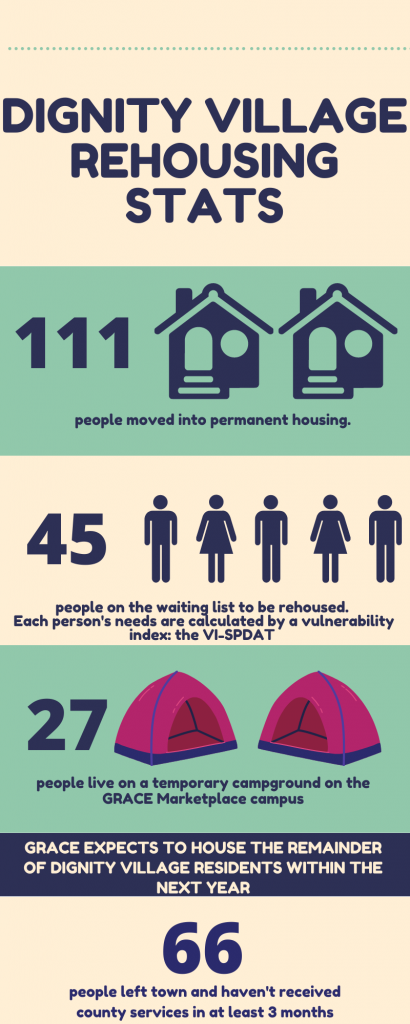By Hannah Himmelgreen
Beth’s apartment is a work in progress, strewn with boxes full of dishes and cleaning supplies and little remnants of her past life. The walls are bare; she doesn’t have much to hang on them yet. Her place is new and still not homey.
But it’s lovely and it’s hers.
For the first time in five years, she has traded in the flimsy shelter of a tent for real walls. She is no longer homeless.
And she thanks GRACE Marketplace for that.
“In all the years I’ve been homeless, this is the first action that’s ever been taken for me,” she said.
Beth, a former public school teacher, was one of 222 people who lived at the now defunct Dignity Village, a homeless tent encampment that sat just 100 feet away from GRACE Marketplace. In May 2019, city commissioners put GRACE in charge of facilitating the closure of the camp. After a series of delays, Dignity Village finally shut down in April of this year, leaving its residents uncertain of their futures.
But the ensuing rehousing process has been surprisingly swift.

Of the 222 people previously living in Dignity Village, GRACE has already moved 111 into permanent housing. Sixty-six left town and have not received any services in a five-county area in the past 90 days. There are still 45 people on the roster waiting to be housed. Of those, 27 are living at GRACE’s temporary campground.
The campground sits at the back of GRACE’s campus, created as provisional housing for the dislocated Dignity Village residents. The winding row of blue and white tents lines a chain-link fence that separates the camp from the space where residents had pitched their own tents before.
From April to November, she watched as, one by one, her neighbors found housing. As their tents were vacated, the campground became the slightest bit quieter.
The tents, dwindling in number as more and more people get rehoused, each sit on identical wooden platforms, shielded from the unforgiving Florida sun by overhead sheets of tarp.
Beth lived in one tucked into the back corner of the camp, close enough to a hole in the fence where she could periodically slip through to feed the stray cats that roamed beyond GRACE’s boundaries.
A tiny and worn multicolored rug lay at the foot of her tent’s zippered opening: her own makeshift welcome mat. And even though Florida is generally humid year-round, she would stuff blankets into the seams of her tent “windows” to insulate against the biting wind of the occasionally chilly nights she had grown accustomed to weathering.
Her “door” faced away from the camp and towards the fence, granting her the tiniest bit more privacy. But she could still hear the bustle of it all: the frustrated yelling coming from the couple a few tents down, the clinking of bottles, the sound of her friend Rupert’s thunderous laugh.
From April to November, she watched as, one by one, her neighbors found housing. As their tents were vacated, the campground became the slightest bit quieter.
Executive director Jon DeCarmine said that, because of pandemic concerns, GRACE has been determined to work twice as fast and twice as hard to rehouse the village’s residents.

People experiencing homelessness are especially vulnerable to contracting COVID-19. They face higher risks of transmission in shared spaces, like shelters, and often lack access to basic hygiene products. Yet, they are largely overlooked in this public health crisis.
But this is not the case for GRACE’s tented guests, who have access to food, showers and restrooms, laundry, a clothing closet and a computer lab.
“A lot of the narrative around the pandemic early on was about how people would be safer at home. And we knew from the beginning that there was no better place for people to be,” DeCarmine said.
“So if anything, we’re working harder to provide people with the basics of dignity and safety more quickly against the backdrop of this pandemic.”
DeCarmine said that, though sheltering doesn’t end someone’s homelessness, the onsite campground is a necessary step to move people in the right direction.
It was set up due to GRACE’s dissatisfaction with the way homeless encampments have traditionally closed: by force and typically involving the police, leaving people without a safe place to stay.
“The issue with this is that when someone would ask ‘where can I go,’ there was never a good answer,” DeCarmine said.
He added that the onsite campground provides Dignity Village residents with a spot where they know they’ll be safe, at least temporarily. It also allows the social workers at GRACE the ability to work with residents directly and on a daily basis to find a home.
Beth’s friend Rupert Heard is one of the 45 still waiting to be rehoused. He used to live on top of the hill in Dignity Village. Now he’s fenced in. Heard says he’s on his third GRACE-provided tent.
Heard was relieved when GRACE welcomed the Dignity Village campers onto its back campus, once an empty field where prison inmates would play baseball.
Encouraged by DeCarmine’s promises of assistance, he decided to stay.
Like Heard, the Dignity Village residents left at GRACE speak highly of DeCarmine. They appreciate that he included them in the process of erecting the tents on the campground. They like that he does not police them.
Heard says he hopes to be a success story for GRACE’s Dignity Village rehousing effort.

Sitting on his old, wheeled office chair, he points out all the empty wooden platforms in the camp, the last remnants of his neighbors’ modest residences. His tent is flanked by two of the bare platforms. They are his reminders that GRACE has been efficient in helping people be rehoused.
A man of faith, Heard keeps a gratitude list in his tent. On it, he has added this possibility of finding a home.
With a giddy smile, he says he’s most excited to regain a sense of independence, to get back on his feet again.
“I don’t need a handout,” he said. “I just need a hand.”
So he was delighted when he heard that his name came up in a meeting about who was next to be considered for housing. Although the process hasn’t started for him yet, he sees what GRACE has done for his neighbors. For friends like Beth.
Housing is not a first come, first served process at GRACE. Rather, every person’s needs are assessed through a preliminary vulnerability assessment to determine the best route of action — it’s triage.
DeCarmine adds that rehousing has been a true community project, successful precisely because of the collaboration between GRACE and various social service agencies in Alachua County.
Sarai Cabrera, the social services director for Alachua County, explains that, together, these providers work to identify priorities for specific housing interventions under the direction of United Way of North Central Florida. In this unified approach, community providers receive referrals through UW for the highest priority individuals.
Those are the folks next in line to be housed.
Permanent supportive rehousing is the main goal that GRACE and its coalition of community providers are working toward. It’s meant to be a lasting situation for individuals who need a little extra assistance, ongoing access to case management and other social services that will help them stay off the streets.
It’s the type of housing that Beth qualified for three months ago, though she says her experience was different than expected.
“It’s very strange being in four walls again. It’s almost too good to believe.”
Her case manager, who worked for Alachua County Social Services, helped her find two prospective apartments. She waited patiently in a nervous sort of excitement, but neither one of those applications was approved. She doesn’t know why.
Then, what she describes as a negative interaction with a GRACE employee left her temporarily banned from campus.
She spent three nights in the nearby woods. Improvising wasn’t new to the self-proclaimed expert camper. She knew how to make the most out of scant resources.
But the thought of losing her chance to find a home gnawed at her. And GRACE’s Dignity Village outreach specialists saw this.
They found an apartment for Beth almost immediately, as she puts it. It is farther from GRACE than she hoped, but it’s near a bus stop and close enough to a grocery store. And she is grateful to finally have a place she can call her own.
“It’s very strange being in four walls again,” she said. “It’s almost too good to believe.”
In the days since Beth has moved in, her case managers have been consistently checking in on her, bringing along food and cleaning supplies. Even furniture.
She is now the owner of a coffee table and a few living room chairs. Although she does not yet have a bed, she brought along the air mattress that she used to sleep on in her tent back on GRACE’s campground.
Most of the furniture she’ll get are items donated to GRACE, but the COVID-19 pandemic lessened and limited the amount of inventory available. Though donations have resumed and typical drop-offs occur on Tuesdays, Thursdays and Saturdays, Beth says that case managers have struggled more to help rehoused residents get the furniture they need.
Nevertheless, she doesn’t mind spending her nights on the air mattress for now. At least she has a roof, hot water, a kitchen and, perhaps most importantly, a laundry machine.
“That is just such a luxury for somebody like me,” she said, adding that she has cleaned everything she brought with her from GRACE.
“I’ve been running it since I got here!”
She loves the elephant ears, taller than her, that grow outside her window. She loves her kitchen, with its new stove and new fridge and abundance of cabinet space that will take ages to fill.
She loves the little spot outside where she can garden. She says she has already buried calla lily seeds into the earth.
And she loves her new mail and house keys, attached to a keychain that one of her case managers gifted her the day she moved in.
It says “mom.”
A few weeks before she moved, she said she’d eventually want to get a dog, a companion to ease the loneliness she’d inevitably feel after leaving the campground.
Underneath her hope and excitement, that feeling of loneliness still lingers.
“It’s very strange when you’ve lived with so many people for so long and then all of a sudden you’re alone,” she said. The last five years of her life were spent constantly surrounded by her neighbors at Dignity Village, a place that, though imperfect, tied people together.
She argued it should have been called the unity community.
Even when it closed, many of the residents remained neighbors at GRACE.
Though she’s far from most of them now, her former tent neighbor, John John, also lives in her complex. She is grateful for his familiar face and to have someone close who understands where she came from.
Thanksgiving Day will mark one week since she opened the door to her new apartment. Usually, she would be celebrating the holiday enjoying a meal with her neighbors at GRACE Marketplace.
But this year, she has something different planned.
She says she’ll spend the day making spinach casserole, her daughter’s favorite childhood meal. She’ll keep it in the fridge until Saturday, when her daughter finally comes to visit.
It will be the first time in five years that Beth’s daughter won’t have to see her in a tent, and Beth is looking forward to that.
Slowly, she is making the place her home.
 Special Report from WUFT News
Special Report from WUFT News